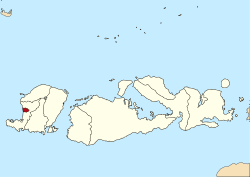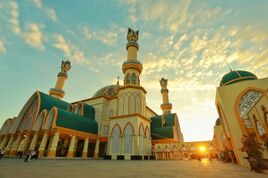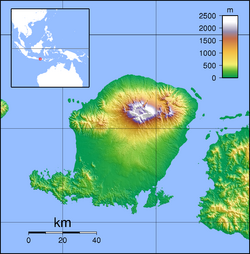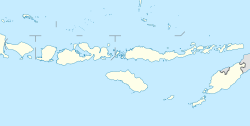مطرم (مدينة)
Mataram | |
|---|---|
| City of Mataram Kota Mataram | |
Clockwise, from top; Hubbul Wathan Islamic center, Mataram seen from above, Mataram City Hall, and Tembolaq Gate | |
 Location within West Nusa Tenggara | |
| الإحداثيات: 8°35′S 116°7′E / 8.583°S 116.117°E | |
| Country | |
| Region | Lesser Sunda Islands |
| Province | |
| الحكومة | |
| • Mayor | Mohan Roliskana |
| • Vice Mayor | Mujiburahman |
| المساحة | |
| • الإجمالي | 61٫30 كم² (23٫67 ميل²) |
| المنسوب | 26 m (85 ft) |
| التعداد (mid 2023 estimate) | |
| • الإجمالي | 441٬147 |
| • الكثافة | 7٬200/km2 (19٬000/sq mi) |
| [1] | |
| منطقة التوقيت | UTC+8 (Indonesia Central Time) |
| Area code | (+62) 370 |
| الموقع الإلكتروني | mataramkota |
Mataram (Indonesian: Kota Mataram) is a city and the capital of the Indonesian province of West Nusa Tenggara. The city is surrounded on all the landward sides by (but is not administratively part of) West Lombok Regency and lies on the western side of the island of Lombok, Indonesia. It is also the largest city of the province, and had a population of 402,843 at the 2010 Census[2] and 429,651 at the 2020 Census;[3] the official estimate as at mid 2023 was 441,147 (comprising 219,625 males and 221,522 females).[1]
The city is an economic, cultural, and education center of the province. It hosts all public universities in the province, the main airport as well as the only international airport in the province, and also main government offices. Greater Mataram Area (Indonesian: Mataram Raya) or sometimes also called Gumi Rinjani Metropolitan Area[4] is a metropolitan area surrounding the city with a total population of around 3 million people on 2015, making it one of the largest in the Lesser Sunda Islands along with Denpasar metropolitan area in Bali.[5]
History
هذا القسم فارغ. بإمكانك المساعدة بأن تضيف إليه. (December 2021) |
There was a small city called Selaparang in East Lombok, which was a centre of Sasak power in Lombok from the 16th to the 17th century AD. West Lombok was under the control of Balinese rajas, based on their states of Mataram and Cakranegara, until the island was invaded and occupied by the Dutch in 1894.
Geography
The modern city is an urban sprawl in the middle of West Lombok, composed of three contiguous towns which were formerly separate but now share a single administration. The old port town of Ampenan in the west merges into the administrative centre of Mataram and this in turn merges into the commercial town of Cakranegara. Further east still lies the district of Sweta, the location of Lombok's biggest market as well as Lombok's bus terminal. The towns are linked by a wide, 8km-long one-way street which begins as Jalan Langko in Apenan, becomes Jalan Pejanggik in Mataram and finishes as Jalan Selaparang in Cakranegara; it then continues east as the principal cross-island highway to Labuhan Lombok and then Kayangan, site of the Lombok-Sumbawa ferry.
Governance
Administrative division
The city consists of six districts (kecamatan), tabulated below with their areas and their populations at the 2010 Census[2] and the 2020 Census,[3] together with the official estimates as at mid 2023.[1] The table also includes the number of administrative villages (all classed as urban kelurahan, also called "kampungs") in each district, and its postal codes.
| Kode Wilayah |
Name of District (kecamatan) |
Area in km2 |
Pop'n Census 2010 |
Pop'n Census 2020 |
Pop'n Estimate mid 2023 |
No. of villages |
Post codes |
|---|---|---|---|---|---|---|---|
| 52.71.01 | Ampenan | 9.46 | 78,779 | 88,022 | 91,311 | 10 | 83118 (a) |
| 52.71.04 | Sekarbela | 10.32 | 53,112 | 58,786 | 60,816 | 5 | 83115 & 83116 |
| 52.71.02 | Mataram | 10.76 | 73,107 | 77,465 | 79,132 | 9 | 83127 (b) |
| 52.71.05 | Selaparang | 10.77 | 72,665 | 68,657 | 68,965 | 9 | 83126 |
| 52.71.03 | Cakranegara | 9.67 | 64,087 | 67,826 | 69,261 | 10 | 83238 - 63239 |
| 52.71.06 | Sandubaya | 10.32 | 61,093 | 68,895 | 71,662 | 7 | 83232 - 63237 |
| Totals | 61.30 | 402,843 | 429,651 | 441,147 | 50 |
Notes: (a) Except the kampungs of Ampenan Tengah (postcode 83112), Pejeruk (postcode 83113), Ampenan Selatan (postcode 83114) and Ampenan Utara (postcode 83511). (b) Except the kampung of Pagutan (postcode 83117).
Demographics
Ethnicity
The Sasak people are the indigenous people of Lombok and form the majority of Mataram's residents. Mataram is also home to people of Balinese, Javanese, Tionghoa-Peranakan people of mixed Indonesian and Chinese descent and a small number of Arab Indonesian people, mainly of Yemeni descent who arrived when the city was known as "Ampenan". Despite being urban dwellers, the Sasak people of Mataram still identify strongly with their origins and the Sasak culture.
Religion
Islam is the religion of over 80% of the population of Mataram. Hinduism has the second largest following with 14% of the population. Other religions practised in Mataram are Christianity, Buddhism, and Confucianism.[6]
Language
Mataram society normally speaks the Sasak language, Bahasa Sasak, which is the native language of the indigenous people of Lombok. Indonesian is the language most widely used in formal business, education and government contexts. When at home or a place of recreation, Mataram residents tend to use the Mataram Sasak language. There is also a large community of Balinese speakers in the city Because in past Mataram was a colony and center of government for the Karangasem kingdom of Bali.
Climate
Mataram has a tropical monsoon climate (Köppen Am) with heavy rainfall from November to March and moderate to little rainfall from April to October.
| أخفClimate data for Mataram | |||||||||||||
|---|---|---|---|---|---|---|---|---|---|---|---|---|---|
| Month | Jan | Feb | Mar | Apr | May | Jun | Jul | Aug | Sep | Oct | Nov | Dec | Year |
| Mean daily maximum °C (°F) | 30.5 (86.9) |
30.6 (87.1) |
30.7 (87.3) |
31.3 (88.3) |
31.0 (87.8) |
30.3 (86.5) |
29.7 (85.5) |
30.2 (86.4) |
30.9 (87.6) |
31.2 (88.2) |
31.2 (88.2) |
31.0 (87.8) |
30.7 (87.3) |
| Daily mean °C (°F) | 26.6 (79.9) |
26.8 (80.2) |
26.5 (79.7) |
26.5 (79.7) |
26.0 (78.8) |
25.1 (77.2) |
24.5 (76.1) |
25.0 (77.0) |
25.9 (78.6) |
26.4 (79.5) |
26.9 (80.4) |
26.9 (80.4) |
26.1 (79.0) |
| Mean daily minimum °C (°F) | 22.2 (72.0) |
23.0 (73.4) |
22.4 (72.3) |
21.7 (71.1) |
21.1 (70.0) |
20.0 (68.0) |
19.4 (66.9) |
19.8 (67.6) |
20.9 (69.6) |
21.7 (71.1) |
22.6 (72.7) |
22.8 (73.0) |
21.5 (70.6) |
| Average rainfall mm (inches) | 290 (11.4) |
237 (9.3) |
170 (6.7) |
114 (4.5) |
108 (4.3) |
72 (2.8) |
77 (3.0) |
54 (2.1) |
62 (2.4) |
126 (5.0) |
190 (7.5) |
282 (11.1) |
1٬782 (70.1) |
| Source: [7] | |||||||||||||
References
- ^ أ ب ت Badan Pusat Statistik, Jakarta, 28 February 2024, Kota Mataram Dalam Angka 2024 (Katalog-BPS 1102001.5271)
- ^ أ ب Biro Pusat Statistik, Jakarta, 2011.
- ^ أ ب Badan Pusat Statistik, Jakarta, 2021.
- ^ "PU-net". perkotaan.bpiw.pu.go.id. Retrieved 12 سبتمبر 2021.
- ^ "PU-net". perkotaan.bpiw.pu.go.id. Retrieved 12 سبتمبر 2021.
- ^ "Peringatan".
- ^ "Mataram climate: Average Temperature, weather by month, Mataram water temperature - Climate-Data.org". en.climate-data.org. Retrieved 25 ديسمبر 2021.
External links
خطأ لوا في وحدة:Authority_control على السطر 278: attempt to call field '_showMessage' (a nil value).
- Pages using gadget WikiMiniAtlas
- Short description is different from Wikidata
- Articles with hatnote templates targeting a nonexistent page
- Use dmy dates from February 2021
- Articles containing إندونيسية-language text
- Pages using multiple image with auto scaled images
- Coordinates on Wikidata
- Articles to be expanded from December 2021
- All articles to be expanded
- Articles with empty sections from December 2021
- All articles with empty sections
- Cities in West Nusa Tenggara
- Populated places in Lombok
- States and territories established in 1993
- Provincial capitals in Indonesia








